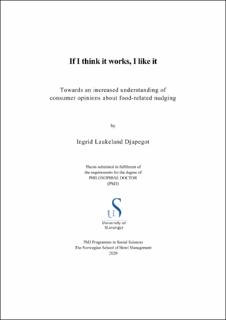| dc.contributor.advisor | Hansen, Håvard | |
| dc.contributor.author | Djupegot, Ingrid Laukeland | |
| dc.date.accessioned | 2020-06-10T11:54:58Z | |
| dc.date.available | 2020-06-10T11:54:58Z | |
| dc.date.issued | 2020-06 | |
| dc.identifier.citation | If I think it works, I like it: Towards an increased understanding of consumer opinions about food-related nudging by Ingrid Laukeland Djupegot, Stavanger : University of Stavanger, 2014 (PhD thesis UiS, no. 518) | en_US |
| dc.identifier.isbn | 978-82-7644-925-9 | |
| dc.identifier.issn | 1890-1387 | |
| dc.identifier.uri | https://hdl.handle.net/11250/2657561 | |
| dc.description | PhD thesis in Hotel and tourism management | en_US |
| dc.description.abstract | Nudging has emerged as an innovative tool to influence consumer decisions within areas ranging from reduction of CO2-emissions, increasing pension savings and facilitating healthy food choice. Nudges aim to guide consumer behavior in pre-decided directions without forbidding the options or changing economic incentives and are part of the behavioral public policy-movement which has arisen throughout the past decade. The increased application of nudges as measures to influence public behavior has however not advanced without controversy, and the current thesis focuses on consumer opinions about the use of nudging in a food-related context. Consumer opinions about nudging have been a largely neglected research area, yet a number of recent studies indicate relatively high support of nudging, despite its somewhat manipulative nature. Perceived effectiveness is identified as an important driver of acceptance of nudging, yet little is known about the underpinnings of this association. In order to provide a deeper theoretical and practical understanding of consumer acceptance of nudging, it is not sufficient to solely focus on identifying factors that are directly associated with acceptance, as it is also crucial to expand the causal chain backward and explore the antecedents behind the main drivers. The overall objective of the current thesis is to increase our understanding of consumer acceptance of food-related nudging. The objective is approached by a two-fold perspective, which aims to shed light on 1) main drivers of acceptance of food-related nudging, and 2) the antecedents of one of the main drivers of acceptance of nudging, namely perceived effectiveness of nudging.
The objective is addressed by means of three research papers. The first paper is dedicated to replicating and extending the knowledge about factors that are directly associated with acceptance of food-related nudging, and the two succeeding papers aim to take a step back in the causal chain by exploring how different message designs influence consumers’ perceived effectiveness of food-related nudging. The main logic of inquiry is a quantitative and deductive research approach, and the first study is designed as a cross-sectional survey, while the two succeeding papers are designed as factorial experiments. The current thesis identifies perceived effectiveness and perceived limited freedom of choice to be significant predictors of acceptance of food-related nudging, and furthermore, a number of aspects related to the message, the sender and the receiver are found to be of significant importance when public information about nudging are communicated. The findings of the three papers in this thesis contribute to increase the knowledge of factors that are directly associated with acceptance of food-related nudging and additionally explores the antecedents of one of the most important drivers of acceptance, namely perceived effectiveness. The thesis thus contributes to increase both theoretical, practical and methodological knowledge within the domain of consumer acceptance of nudging, and the findings also hold several implications for policymakers that are planning to implement nudging as part of public policy. | en_US |
| dc.language.iso | eng | en_US |
| dc.publisher | University of Stavanger, Norway | en_US |
| dc.relation.ispartofseries | PhD thesis UiS; | |
| dc.relation.ispartofseries | ;518 | |
| dc.relation.haspart | Paper 1: Djupegot, I.L. & Hansen, H. (2019): If It Works, I like It: Consumer Acceptance of Food-Related Nudging, Journal of International Food & Agribusiness Marketing (Not in Brage) | en_US |
| dc.relation.haspart | Paper 2: Djupegot, I.L. (2019), "Investigating young adults’ perceived effectiveness of textual information about food-related nudging", British Food Journal, Vol. 122 No. 2, pp. 489-502. | en_US |
| dc.relation.haspart | Paper 3: Djupegot, I.L. & Hansen, H. Win some, loose some: The effect of valence framing, target group selection and dominant regulatory focus on the perceived effectiveness of nudging. Not yet published. | en_US |
| dc.rights | Navngivelse 4.0 Internasjonal | |
| dc.subject | food nudging | en_US |
| dc.subject | økonomi | en_US |
| dc.subject | kundeatferd | en_US |
| dc.title | If I think it works, I like it: Towards an increased understanding of consumer opinions about food-related nudging | en_US |
| dc.type | Doctoral thesis | en_US |
| dc.rights.holder | ©2020 Ingrid Laukeland Djupegot | en_US |
| dc.subject.nsi | VDP::Samfunnsvitenskap: 200::Økonomi: 210 | en_US |
